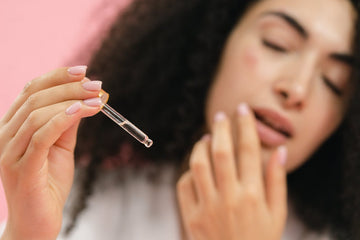Если вы не уверены, какой витамин лучше всего подходит для отбеливания кожи и сияния. Стремясь к гладкой, светлой и безупречной коже, миллионы людей ищут натуральные, безопасные варианты.
Кроме того, будучи важными для вашего общего здоровья, витамины также необходимы для устранения темных пятен, снижения пигментации и восстановления яркой молодости вашей кожи.
К концу этого руководства вы узнаете о лучшие витамины для отбеливания кожи и сияния, какие продукты питания или средства по уходу за кожей приносят наибольшую пользу, как они работают и самые безопасные способы их использования.
Лучшие витамины для отбеливания кожи и сияния
1. Витамин C – мощное средство для осветления
-
Как это работает:
Аскорбиновая кислота, или витамин C, является одним из лучших антиоксидантов для кожи. Подавляя способность фермента тирозиназы вырабатывать меланин, она помогает уменьшить пигментацию и темные пятна. Кроме того, стимулирует выработку коллагена, что делает кожу более гладкой и сияющей. -
Лучшее для: Отбеливание кожи, уменьшение гиперпигментации и антивозрастной эффект.
-
Лучшие источники: Цитрусовые, болгарский перец, киви, клубника, брокколи.
-
Местное применение: Сыворотки с витамином C (10–20%) очень эффективны для ежедневного осветления кожи.
Примечание по безопасности: Высокие пероральные дозы могут вызвать проблемы с желудком; придерживайтесь органических источников или добавок, одобренных дерматологами.
2. Витамин A – для обновления кожи и светлого тона
-
Как это работает:
Старые, пигментированные клетки были заменены свежими благодаря ускоренному обновлению клеток под воздействием витамина A (ретиноиды/ретинол). Это уменьшает неравномерный тон, мелкие морщины, складки и акне. Ретиноиды часто рекомендуют дерматологи для улучшения яркости и восстановления кожи.
-
Лучшее для: Светлый тон, шрамы от акне, антивозрастной уход.
-
Лучшие источники: Морковь, сладкий картофель, листовая зелень, яйца, рыбий жир.
-
Местное применение: Кремы с ретинолом и рецептурные ретиноиды.
Примечание по безопасности: Частое применение витамина A может быть опасным. Высокие дозы ретиноидов не рекомендуются для беременных женщин.
3. Витамин E – защитник кожи
-
Как это работает:
Витамин E, как жирорастворимый антиоксидант, защищает кожу от загрязнений и УФ-излучения, предотвращая окислительный ущерб и пигментацию. Он дополняет витамин C, компенсируя повреждения и улучшая состояние кожи.
-
Лучшее для: Удержание влаги, защита от солнечных повреждений, выравнивание тона кожи.
-
Лучшие источники: Миндаль, семена подсолнечника, шпинат, авокадо, оливковое масло.
-
Местное применение: Масло витамина E, сыворотки и кремы.
Примечание по безопасности: Избегайте чрезмерного приема витамина E внутрь, так как он может разжижать кровь; замените его добавкой с низкой дозой или пищевыми продуктами.
4. Витамин B3 (Ниацинамид) – для ровного тона и сияния
-
Как это работает:
Ниацинамид сужает поры, уменьшает жирность, снижает пигментацию и укрепляет защитный барьер кожи. Это одно из средств для осветления кожи, которое дерматологи рекомендуют чаще всего.
-
Лучшее для: Жирная или склонная к акне кожа, гиперпигментация, неровный тон кожи.
-
Лучшие источники: Птица, рыба, орехи, яйца, бобовые.
-
Местное применение: Сыворотки с ниацинамидом (2–10%) уменьшают темные пятна и осветляют кожу без раздражения.
Примечание по безопасности: В целом безопасно, но очень высокие дозы добавок могут вызвать покраснение.
5. Витамин D – для заживления и баланса кожи
-
Как это работает:
Витамин D борется с шероховатостью и воспалением, регулируя развитие клеток и заживление; однако он, по-видимому, не является естественным пигментом кожи. Кожа с дефицитом может выглядеть пятнистой и стареющей. -
Лучшее для: Восстановление, увлажнение, общее здоровье кожи.
-
Лучшие источники: Солнечный свет, лосось, тунец, обогащённое молоко, яичные желтки.
- Местное применение: Редко встречается в уходе за кожей, но добавки помогают при тусклости, связанной с дефицитом.
Примечание по безопасности: Уберите избыточные добавки; чрезмерное потребление витамина D может вызвать токсичность.
Сравнение витаминов для отбеливания кожи
|
Витамин |
Основное преимущество |
Лучшее для |
Источники |
|
У |
Снижает пигментацию, осветляет |
Отбеливание кожи, сияние |
Цитрусовые, сыворотки |
|
А |
Ускоряет обновление клеток |
Светлый тон, антивозрастной эффект |
Морковь, ретиноловые кремы |
|
Е |
Защита от УФ & загрязнения |
Увлажнение, ровный тон |
Орехи, масла, авокадо |
|
B3 |
Устраняет пятна, контролирует жирность |
Жирная кожа, следы от прыщей |
Рыба, птица, сыворотки |
|
Д |
Восстанавливает и балансирует кожу |
Тусклая, сухая кожа |
Лосось, обогащённые продукты, солнечный свет |
Как использовать витамины для светлой и сияющей кожи
-
Сбалансированное питание – Ешьте фрукты, овощи, цельнозерновые и белки, богатые витаминами.
-
Местные средства – Выбирайте сыворотки с витамином C, ниацинамидом или ретинолом для целенаправленного осветления.
-
Прием добавок с осторожностью – Принимайте только по назначению врача после выявления дефицита.
-
Защита от солнца – Всегда используйте солнцезащитный крем, так как ультрафиолетовые лучи нейтрализуют эффект осветления.
-
Последовательность – Видимые результаты появляются через 6–12 недель регулярного использования.
Возможно, вы найдете органические средства по уходу за кожей с витамином Vixxar.
- Набор для ночного ухода с коллагеном – Ночной крем против старения, сыворотка и уход за глазами (веганский, без отдушек)
- Жидкий эксфолиант с гликолевой кислотой – 7% AHA для сияющей, гладкой кожи
- Питательное масло для лица 20ml
- Сыворотка с витамином C 30ml
Смотрите больше от Vixxar Органические средства по уходу за кожей и волосами.
Заключение
Итак, Какой витамин полезен для осветления кожи?
-
Витамин C для осветления и сияния.
-
Витамин A для светлоты и обновления.
-
Витамин E для защиты и увлажнения.
-
Витамин B3 для ровного тона.
-
Витамин D для баланса и восстановления.
Эти витамины работают вместе, обеспечивая коже яркий, безупречный и сияющий цвет лица. Питательная диета в сочетании с правильно подобранными топическими средствами ухода обеспечивает наилучший эффект.
Часто задаваемые вопросы
В1. Какой витамин лучше всего подходит для осветления кожи?
Витамин C — лучший для осветления кожи, так как он уменьшает пигментацию и придает коже сияние.
В2. Может ли витамин A сделать кожу светлее?
Да, витамин A стимулирует обновление клеток, уменьшает пигментацию и улучшает общий цвет лица.
В3. Осветляет ли витамин E кожу?
Витамин E защищает от солнечных повреждений и загрязнений. В сочетании с витамином C он помогает осветлить кожу.
В4. Полезен ли ниацинамид для осветления кожи?
Да. Ниацинамид (витамин B3) уменьшает темные пятна, регулирует выработку кожного сала и выравнивает тон кожи.
В5. Какой дефицит витаминов вызывает тусклость кожи?
Дефицит витаминов C, D и комплекса B может привести к тусклой и неровной коже.
В6. Можно ли принимать добавки для осветления кожи?
Да, но только по медицинским показаниям. Топические сыворотки безопаснее для целенаправленного осветления.
В7. Сколько времени нужно, чтобы витамины начали действовать?
Обычно требуется 6–12 недель регулярного использования, чтобы увидеть заметные улучшения кожи.






